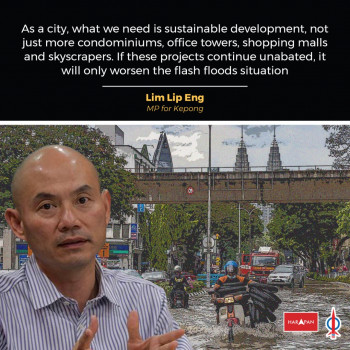By Mohd.Ariff Sabri bin Hj. Abdul Aziz, MP for Raub, Pahang
I have written an article on GST in Bahasa Melayu. It was titled “Mengenai GST, dimana kawasan2 kerisauan kita?” Here is an English version. It will expand on some of the ideas set in the B Malaysia version. I hope to gain a wider audience who will see that GST is detrimental to the economy. As correctly pointed out by a few readers, what is the use of writing? These articles are not going to be read by kampung people.
A few people reading and understanding is enough.
My answer is, it does not matter if not many kampong people read it. It is sufficient and only just necessary for some intelligent people read them, expand and retell them to others. That would be good enough.
GST is bad for your financial health.
What needed to be told is that GST is bad for you. Good for the government because it enables them to milk the cow fullest. The horror stories will come when more money falls into the hand of this government and all those financial skulduggery start.
The worse affected will be the fixed income earners and the lower income groups. They will face a higher cost of living, having to set aside a higher proportion of their income for GST and finding the remainder of their income shrinking in value. The planned award of RM300 BR1M is scandalous; people will have to endure the GST for the entire year, while RM300 is a one off gift that contributes RM0.82 or 82 sen per day. Can we expect RM0.82 a day to cushion people from the shocks of price increase?
The concerns of economists.
An economist is concerned with the following main issues:-
1) The concentration of funds in the hands of a spendthrift government is worrying. The record of the BN government is utterly bad in this aspect and additional revenue into the coffers is a cause of concern. The principle we hold, as a libertarian economist regarding taxpayers’ money is, it is better to have our own money in our own hands than in the hands of pilfering others. We may rue the day we agree to let the BN government have more money.
2) From the point of income distribution. GST causes negative impact on lower income groups such as those earning less than RM3000 a month. It affects lower income Malays most. They spend a higher proportion of their income on GST and this makes GST a regressive tax. This is an economist definition of regressive tax. If the lower income groups spend a higher proportion of their income on GST than the proportion of income set aside by higher income groups, then GST is regressive. GST eats more into the income of lower income groups reducing their effective income than it does on the income of higher-earning groups. This may increase the income divide further and increase the GINI coefficient.
3) The impact of GST on general price level (inflation). Yes it will cause a rise in general price level. The end consumer lives under an illusion that the GST paid by preceding supply chainers is fair and just. All that the supply chain shows are supply chainers have declared the taxes they must pay the government what they have transparently paid the government does not necessarily translate into fair prices. To the economist, the price of a product is not determined by GST but by supply and demand.
4) The decrease in effective demand which may actually lead to slower growth rate of the economy.
160 countries can’t be wrong.
Let us examine the ‘iron clad’ arguments of the BN MPs. The most popular argument for GST by BN MPs is the reference to 160 countries having implemented GST. BN MPs always asked: if GST is not good, please tell us why they implement it?
If 160 countries have implemented it, it must be good. What they failed to explain is good in what sense. It is certainly good in the sense that it is like the trawler net which catches everything off the bottom of the sea and everything in its path. Fish fry, the bottom feeders, the less strong fishes or anything caught in its path. It destroys also the ocean ecosystem if anything other than fish were to be in the path of the dragnet. It is good in the sense it can collect more taxes without waiting for the end sale. Under GST, tax is collected at each stage of the supply chain.
They just want MORE of our Money.
It is good in that sense. Yet the fact that 160 countries apply GST is not a reflection whether it is good for the economy, good on lower income groups, whether it is inflation neutral and so for. The fact that 160 countries adopt GST only goes to prove that every one of the 160 countries WANT MORE MONEY in their treasury. Each wants more money for different reasons.
The more than 40 African countries, the 4th worlders want more money so that the despotic rulers and dictators can have more money to spend on gold toilet seats, gold taps and gold beds. India wants more money because it wants to spend on welfare for the many millions of its wretched poor; England has a well-developed welfare state. Western European countries need more money also to spend on welfare. More money in the hands of such countries is less worrying because they have this culture of responsible accounting for other people’s money.
Malaysia’s only common ground associating itself with all the 160 countries is, like each of the 160 countries, it wants more money. GST will allow it to have MORE money in its hands. It has run out of money to spend. Why does Malaysia want more money is the question everyone should be asking. The answer is because it has been spending badly. This is due to many because; because the treasury has so many leakages; because there are many tax evaders. UMNO people seem to get immediate gratification when they think most of the tax evaders are the bloody Chinese. It is also because operating expenditure is ballooning. Further, it is also because it cannot borrow money without having to pay higher interest costs. Finally , it is because others see Malaysia as a bad credit risk.
Fitch has downgraded Malaysia to negative. Moody has given a better financial health but warned things can go bad overnight should Malaysia continue with its errant ways.
These are the real reasons why Malaysia needs more money. Not because it wants to help the poor. Can anyone tell us if the government is serious in wanting to help the poor when it withdrew subsidies helping them out while retaining the bigger subsidies going to TNB and IPPs?
How much will GST generate in additional value? It adds up to between RM6-7 billion extra making a total of RM23 billon. Estimates from accounting firms have it at RM33 billion adding up RM17 billion more.
The people who control the purse are salivating. There’s more money to spend. We will have more money to create projects for cronies and rent seekers. More money to award grants. More money to underwrite bond issues by SPVs and GLCs. We must never believe when the government says, with more money, we will help out the poor.
To an economist this is a cause of concern. Concentration of money in the hands of the government creates opportunities for more abuses. The government has a bad record in spending within its means. For the last 12 years, Malaysia has deficit budgets. It services interest payment at around RM20 billion a year.
It sees no other way of raising revenue other than squeezing blood from stone so to speak. It cannot raise more taxes. As it is the poorer people don’t pay taxes because they are poor. The more agile and sly business people evade paying taxes by all sorts of creative accounting and misreporting, underreporting and so forth.
Since 1998, this government has spent more than it earned. The culture of prudent and judicious spending is not in their vocabulary. To bridge the gap between revenue and spending, the government borrows money. They take loans. They issue bonds. The total amount of bonds and IOU bills issued by the government is public sector debt.
According the CIA Factbook, in 2012, Malaysia’s Public debt is now over 55% of GDP. This means, it has breached its own debt ceiling of 55%. The 55% ceiling is in accordance to the Loan Act 1959 and Government Funding Act 1983. It is not something done whimsically. Changing on the limit however is done discretionally. In 2003, when the MP for Rompin was 2nd Finance Minister he set it at 40%. When Nor Mohamad Yaakob became 2nd Finance Minister, it was raised to 45%. When Husni Hanazliah became Minister, he raised it to the current 55%. The provision for setting a celling is accorded for by law. Actually setting what limit is done at the discretion of the ruling government.
Public debt is actually more than 55%. If we take into account all those loans and bond issues guaranteed by GLCs and SPVs, it is as good as the government taking up loans circumventing the 55% of GDP ceiling. Dana Infra issued bonds worth RM20 billion. Pembinaan BLT, a GLC tasked with the construction of 74 Police Quarters all over Malaysia took a loan of RM10bliion. The total value of contingent loans is estimated at more than RM100 billion. Adding these to the more than 550 Billion public debt, would make total public debt more than 600 billion.
The BN MPs are quick to justify public sector debt. Japan’s public sector debt is more than 200%. Singapore is over 100%. These economies take up bigger debts. That is true, but it is also true, these countries have strong economies to absorb and pay the debt. That is ok if the economy has the capacity to pay back the loan. Our future is so uncertain; we don’t know whether the government can pay this loan. The liability will be borne by future generations who will face the prospects of rising income taxes, higher prices and higher GST. When GST is implemented, the government will collect and have more money. Will they use it to reduce public sector debt? They will not because, even now they justify the collection of more money to finance its desire to help poorer people, carry out projects and so on. Meaning, they want to spend more.
This is the danger then. It proves once again that public debt and budget deficits in this country under BN government are structural. With less or more money, the government will borrow more and more and increase its debt. A prudent government will reduce its debt when the government has more money. People must realise that public debt is an indirect tax on them since they will have to be taxed more in order to pay off debts.
The claim that with more money, we can help more people is a lofty objective. We can transfer income from the rich to the poor. The problem with this claim is, it depends entirely on the government’s publicly stated beneficence. Between what it proclaims and what it actually does, is just that- a claim. What it does actually may be very different what it has claimed.
This dependence is inherently unstable because the government can operate entirely on its discretion. If it likes a particular community, it will help more while discriminating those they dislike. BN can help more in states that support them and they can help groups that support them more at the expense of those that don’t. This is a government that spends because it wants to reinforce the master-slave relationship or patron-patronised relationship.
This government has a bad record in spending wisely and justly. This is a cause of worry. If it spends more because it thinks now it can always collect more money, the objective of reducing deficits is defeated. We all know this government is dangerous when it comes to managing taxpayers’ money. We can build an overhead bridge linking KL Sentral to the museum for RM50 billion, we opted to build an underground passage for RM340billon. This defies the logic of financial prudence. We could have bought armoured fighting vehicles for RM3.5 million each; we opted to buy 257 units at RM30million each. We could have bought a helicopter at RM85 million per unit, we bought 12 at RM193million per unit. We planned to build six units of patrol boats at RM350 per unit; we changed it to RM1.5 billion per unit.
Our money is not safe with BN people around the treasury. We have burnt the bridge linking to financial prudence a long time ago.
*This article was first published in sakmongkol.blogspot.com




A very clear information.Kudos to the writer.
I think the figure numbers that were written in 2nd last paragraph are not correct. Mistaken million as billion and so on.
our malaysia economy droping not yet 2015 now only december also going down …. make ppl scare use money and spend money i very dissaipointed … why gst so high … if 1 or 2 percent still ok … terus up 6 percent how ppl can tahan ? sometimes our buinese also no 6 percent profit
can u guy fight for it ? dont so high .. many buinese will close up next year still like this
goverment no think our rakyat buinese very hard now come this gst i can say next year many buinese men will close up and those small big companies will close too like this u will make the economy lagi teruk